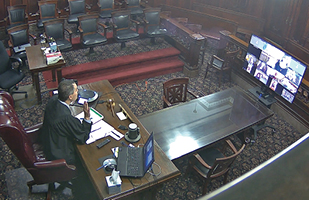“E-Adoptions” Granted: Supreme Court Funds Help Families Grow

Mahoning County Probate Court Judge Robert Rusu’s new videconference platform is online after two years of planning, and receiving an Ohio Supreme Court technology grant.

Mahoning County Probate Court Judge Robert Rusu’s new videconference platform is online after two years of planning, and receiving an Ohio Supreme Court technology grant.
When the Ohio Supreme Court authorized more than $6 million in remote technology grants, it did so to help courts continue operations during COVID-19. Some of those funds helped a Mahoning County judge continue his favorite duty – finalizing adoptions.
Probate court Judge Robert Rusu has converted to virtual adoptions since statewide stay-at-home orders were issued in March. He was able to hold the cyber hearings after receiving more than $11,000 from the Supreme Court for videoconference upgrades.
“I didn't want to stop this process. I know the family is always looking for closure. They want that finality,” Judge Rusu said.
It was welcome news to the adopting families, who were concerned about the status of their cases with reduced court staffing and services to limit the spread of the coronavirus. With the new equipment and software, only the judge is required to be in the courtroom to operate the meeting, which can involve up to 50 people.
“The best is having people here in the court, but this is the next best thing,” Judge Rusu said.
The first case reunited sisters after the older sibling – both are toddlers – was adopted last year. That session reached viewer capacity as extended family from across the country witnessed the occasion.
His second case involved another young girl. The 2-year-old legally became the daughter of first-time foster parents, who had cared for the child since she was born.
The pandemic has prevented other adoptions from being fulfilled since child welfare assessors currently are not allowed to complete home visits. On average, the court completes around 60 adoption cases annually.
As a probate judge responsible for several other types of cases, Judge Rusu also has utilized the court’s new technology to manage other parts of his caseload. Those include pretrial hearings in his civil docket, and to meet with people who are part of an assisted outpatient treatment program designed to help keep those with serious mental illnesses out of jail.
While the proceedings via videoconference are currently a necessity, the court recognizes its future practicality whenever operations fully resume under a “new normal.” The alternatives can allow a growing family to share their joy with loved ones anywhere in the world, or put involved parties in the courtroom without physically being there.
“It's huge. That [access] is the whole point of it. Now, they can always be part of it,” Judge Rusu said.


